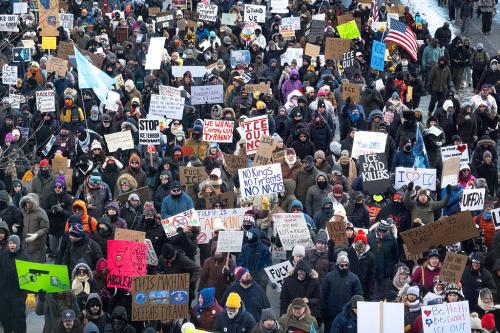House Energy and Commerce Committee Chairman Billy Tauzin found a sure-fire way this week to get a lot of television coverage: He had network news executives grovel at a hearing over the failures of their Election Night coverage.
Talk about misplaced priorities. Yes, the networks have a lot to answer for. But the people who run our government and our electoral system have even more to answer for.
Ask yourself what should be our biggest concern: that the networks called Florida wrong on Election Night? Or that the officially certified, Supreme Court-sanctioned vote count is so widely seen as flawed that the much-criticized news media have had to undertake their own tally, after the fact, to find out who really won the election?
Believe me, I had intended to stay away from this subject for awhile. But once Tauzin put the election back in the news, it’s hardly surprising that attention drifted from the media sideshow to the central issue. “Million of votes are thrown out in election after election in this country,” said Andrew Lack, president of NBC News. “Now that’s a story.”
Congress does not control the news media. But Congress could do a great deal about fixing flawed voting systems. Rep. Bobby Rush, an Illinois Democrat, wondered when his colleagues would find the time to look into “the issue of those who were denied the right to vote.” Don’t hold your breath.
Tauzin, a shrewd Louisiana Republican, prefers the media story because he can put a nice partisan spin on the narrative. In the middle of the recount wars last November, he lashed out at the news media and declared that “there is now a presumption of bias in the reporting”—in favor of Democrats, of course.
On Wednesday, he continued to insist on bias in the media voting models. But with the election now in the bag, Tauzin graciously declared that he saw “no evidence of intentional bias.” But should a free press have to worry about getting the imprimatur of a congressional committee chair?
Louis Boccardi, president of the Associated Press, showed real spine when he told the committee that “an official government inquiry into what are essentially editorial matters is inconsistent with the First Amendment values that are fundamental to our society.”
None of this means the networks should be proud of themselves. Tauzin and his Republican colleagues are right to complain that Florida should not have been called for Al Gore before the polls had closed in the entire state.
The foolish rush to be the first network to call races—Ben Wattenberg of the American Enterprise Institute called it “a collective drag race”—should end. But how wrong were those calls? The Washington Post’s analysis of “overvotes,” cases where voters mistakenly punched more than one hole in a ballot, suggest that Gore might have suffered a net loss of close to 30,000 votes because of voter confusion. (Bush’s official margin was 537 votes.)
It may turn out that the first projection for Gore, based in part on exit polls, was correct as a measure of how a plurality of Floridians thought they had voted. Isn’t it a terrible problem for democracy if the media voting models, with all their flaws, were a truer reflection of voter intent than the certified vote count?
And if there was a call on Election Night that truly transformed political reality, as Rep. Henry Waxman (D-Calif.) noted, it was the second call of Florida—for Bush. It was made despite the fact that the bulk of the outstanding ballots were from Democratic areas. Once Bush was declared president, the politics of the recount were tilted powerfully in Bush’s favor. Absent that call, there might have been a real and complete recount in Florida. Either Gore or Bush could have claimed the White House free from charges that the election had been “stolen.”
Tauzin has a point when he suggests uniform poll closing hours across the country to minimize the problems created by early media calls. But to do this right, a price would have to be paid. The polls shouldn’t be closed so early that voters on the West Coast would be cheated out of time to cast their ballots. This is an issue of fairness, because less-affluent voters tend to vote later in the day. In the interests of democracy, we should be willing to wait at least until 10 p.m. or 11 p.m. Eastern time to shut the election down.
But if Congress limits its inquiries to the media and to poll closing hours, it will be ignoring the most important things that went wrong last November. Maybe that’s what this Congress wants to do.
The Brookings Institution is committed to quality, independence, and impact.
We are supported by a diverse array of funders. In line with our values and policies, each Brookings publication represents the sole views of its author(s).



Commentary
Op-edThe Billy Tauzin Show
February 16, 2001